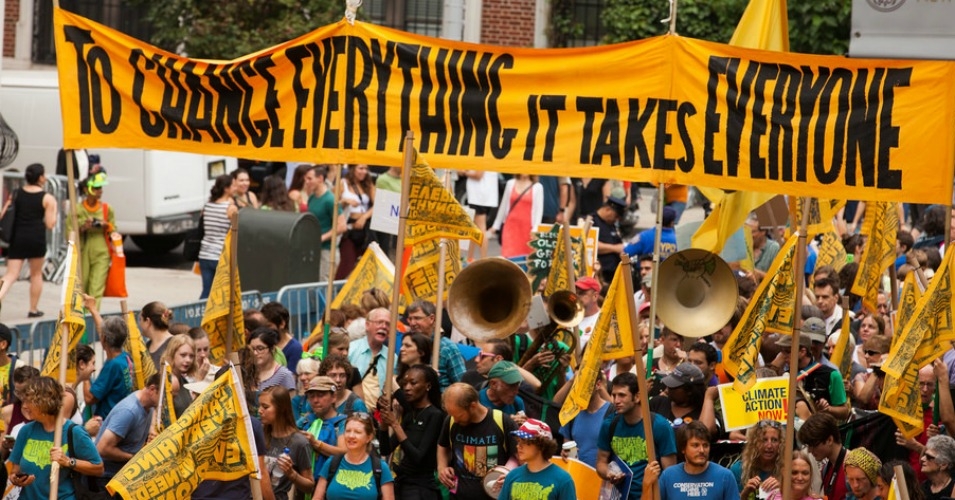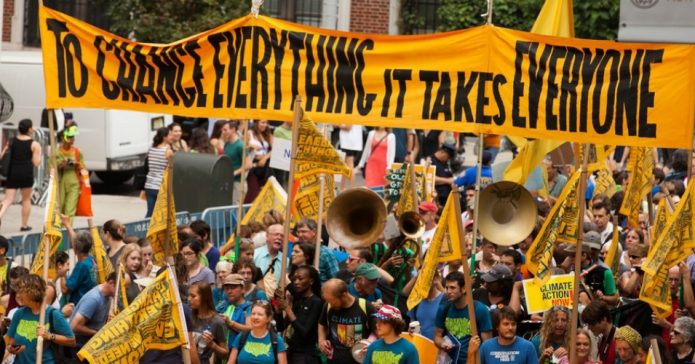Resistance to the Trump administration’s attacks on immigrants, climate change policy, and economic fairness has been fierce. But alongside these efforts—from flooding representatives’ phone lines to packing town hall meetings to marching in protest—it’s also important to begin the work of building alternatives to the systems that underlie the exploitation of people and planet.
The understandable focus on Trump—with his cronyism, bombast, and militarism—can divert us from the fact that several decades of extractive capitalism have fueled extreme wealth and racial inequality, democratic demise, and brought us to the brink of ecological ruin. Wall Street’s debt-based financing system has created a phantom wealth economy delinked from the real economy of goods and services. Trumpism is only the latest appalling chapter in a dominant narrative that holds our unsustainable economy in place, including the myths that a rising tide lifts all boats and that growth is the answer.
In the face of renewed calls for trickle-down economic policy—such as proposed tax cuts for the rich and transnational corporations—we urgently need a clearly articulated theory and practice of sustainable economics that works for local communities. Enter a blessing of a book, Anthony Flaccavento’s Building a Healthy Economy from the Bottom Up: Harnessing Real-World Experience for Transformative Change.
Bottom Up is a comprehensive primer on the transition to a new economy—the place-based movement to rewire the economy for equity and ecological sustainability. It is rich in stories and detail for the curious or discouraged and those seeking a strategy to move toward a sustainable and equitable future. Flaccavento excels as a storyteller, reporting on successful “bottom-up” ventures and experiments in building new systems around food, energy, health services, worker ownership, community finance, and place-based arts and culture.
Flaccavento’s perspective is grounded in his work as a farmer, entrepreneur, and candidate for Congress, with decades of experience building a regional food system and relocalized economy in southern Virginia. While he lifts up inspiring examples of urban local economy projects, he also deeply understands the challenges facing rural communities that have been bypassed by the lopsided economic gains of the past four decades. In regions like southern Virginia, where the median income is below $30,000 a year and the poverty rate is over 25 percent in some communities, new economy solutions have the potential to transcend political differences by creating and fixing infrastructure, generating jobs, increasing food security, and reducing energy costs.
We cannot coast on a “small is beautiful” community garden project or worker-owned café—not while federal policies push down wages.
One challenge in the Trump era is how to leverage place-based movements to impact national policy. I have witnessed local economy activities in New England that appear to operate in a parallel universe, one delinked from national debates over health care, taxation, energy, and farm policy. What would it take to leverage the millions of people who have become engaged in new economy enterprises to be a political force that reshapes the rules governing our national economy? What would a “bottom-up” policy program look like at the state and federal levels?
Flaccavento urges us to move beyond what he calls a “false choice” between local and national issues to recognize “that almost every positive change we make in our own communities is ultimately either undermined or supported by broader economic and political choices.” We cannot coast on a “small is beautiful” community garden project or worker-owned café—not while federal policies push down wages, shift billions to the military, and subsidize corporations that destroy Main Street commerce.
The tools for change that Flaccavento offers in Bottom Up resonate with the social change frameworks of deep-ecology thinker Joanna Macy and Indian independence leader Mahatma Gandhi.
…

